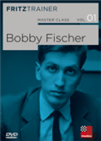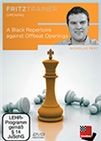Classical chess or Fischer Random?
Reflections on a (still) unequal pair of twins
Although the second FIDE World Championship in Fischer Random recently took place with Nakamura, Nepomniachtchi, Carlsen and Abdusattorov, to name just four of the eight finalists, the followers of this chess discipline with its 960 possible basic positions still feel like something exotic in chess clubs and chess communities. Not everywhere, but this sense of the matter is very widespread. More than 20 years of intensive efforts by private organizers and individual clubs, in our country above all by Hans-Walter Schmitt and his Chess Tigers, have not changed this decisively.
 No other World Champion was more infamous both inside and outside the chess world than Bobby Fischer. On this DVD, a team of experts shows you the winning techniques and strategies employed by the 11th World Champion.
No other World Champion was more infamous both inside and outside the chess world than Bobby Fischer. On this DVD, a team of experts shows you the winning techniques and strategies employed by the 11th World Champion.
Grandmaster Dorian Rogozenco delves into Fischer’s openings, and retraces the development of his repertoire. What variations did Fischer play, and what sources did he use to arm himself against the best Soviet players? Mihail Marin explains Fischer’s particular style and his special strategic talent in annotated games against Spassky, Taimanov and other greats. Karsten Müller is not just a leading international endgame expert, but also a true Fischer connoisseur.It is well known that many grandmasters who are tired of the sprawling opening theory and its consequences for competitive chess prefer to play Fischer Random rather than so-called ‘classical chess’ and have far fewer problems with the changeover than the average amateur who brings his opening variations and systems to the board like a life insurance policy. It is not the unknown that attracts him, but the solid ground under his feet, where he is sure not to fall into some hole. That is better left to the opponent. Fischer Random is not an issue for him, although he hardly knows it. Typical objections: “I would have learned everything I know about openings for nothing”, or “I hardly understand normal chess, why should I do this to myself? You can’t beat the classical starting position with its symmetry and inner harmony”.
The point here is not to convince critics and sceptics of the merits of Fischer Random, especially as this is most likely to succeed if someone has their own experience with it. And, of course, there is no good arguing about taste. But a basic insight, which also reached FIDE in 2009 at the latest, should by now be indisputable: Fischer Random or Chess960 is in no way inferior to classical chess and is at least as substantial, whether you like it or not. The fact that many, if not most, games that originate from a Chess960 starting position take on more and more moves of the positional patterns we are familiar with is an unmistakable indication that this type of chess basically hardly differs from classical chess. The games only have a different history of origin.
In the appendix, four positions are given as examples, each after White’s 20th move, two of which come from classical chess and two from Fischer Random games. Try to match the positions correctly without using tools such as databases. It might not be that easy, and most of the time you will hardly succeed. (You can find the corresponding games in our dynamic replayer at the end of the article).
Occasionally, observers attribute the tendency towards traditionalism to the fact that the players strive for familiar positional patterns. This is probably true to some extent, but should not be overestimated. What is more decisive is that the inner logic of chess leaves them little choice but to follow the laws of space, force and time. These apply in Chess960 just as they do in classical chess. What other strategic and tactical motives, what other techniques should work here?
What really does not promise success would be the attempt to transfer the opening principles from classical chess one-to-one to Fischer Random. It is true that all these opening principles generally apply in the random variant, but the priorities often have to be set or observed quite differently if, for example, a pawn is uncovered in the starting position and can already be threatened by a bishop or queen on the first move.
A typical case: an uncovered pawn on a7 is attacked by a bishop on g1 after 1.f3 or 1.f4, and if there is still a trapped black rook on b8, then hallelujah! Occupying the centre with 1...d5 or 1...e5 wouldn’t be such a good move, but that doesn’t mean that the centre no longer plays a role. After the second move, things can already look significantly different.
It is precisely this relativity of the theorems that makes the Fischer Random so appealing to its followers and all those who value creativity as the highest good. My conclusion: classical chess and Fischer Random are basically twins. According to my definition, Fischer Random is nothing other than neoclassical chess and should no longer be thought of and treated only as an antithesis to classical chess. As far as I am concerned, it is also neo-romantic, but that is another matter. We should not narrow the definition of classical chess to the starting position, but consider the totality of chess rules as constitutive. Changes at one point do not necessarily mean that the whole edifice collapses. On the contrary, one must even make small changes from time to time, measured in decades and centuries, to keep the whole thing alive.
But enough of the long preface. The question that is on my mind, and I’m sure on the minds of others, is: what should happen next for those chess players who would like to see and play more Fischer Random, but find too few opportunities to do so?
Above all, there are too few opportunities for long games under tournament conditions. Online play is not a satisfactory solution in principle, apart from the fact that 90% of the games there are only blitzed. Quick tournaments, which are offered here and there by clubs and private organizers are much more attractive, but there are still far too few of them in each area, and they are (understandably under cost aspects) only rapid tournaments and not comparable to classical tournament chess.
 Many club players have their favourite pet opening variations which aren’t necessarily main lines. It’s important to know how to handle these variations as your opponent will likely know his systems well. In this DVD, GM Nicholas Pert provides a detailed Black repertoire against many of these Offbeat Opening choices.
Many club players have their favourite pet opening variations which aren’t necessarily main lines. It’s important to know how to handle these variations as your opponent will likely know his systems well. In this DVD, GM Nicholas Pert provides a detailed Black repertoire against many of these Offbeat Opening choices.Should we wait until the enthusiasm for Fischer Random to trickle down from the top to the bottom? Until the number of Fischer Random fans grow so large that large open tournaments are profitable for organizers and regional and local championships become a matter of course? That may take time because not only God’s but also Fischer’s mills grind slowly.
If classical chess and Fischer Random are basically twins, why can’t they appear together in a tournament? To put it quite concretely and simply: in any chess tournament I would like to have the freedom of choice to play a Fischer Random game with my opponent, if he ‘ticks’ the same way as I do, instead of a game with the classical starting position. In my opinion, there is nothing against this in principle, even if some technical peculiarities occur that mean extra work for the tournament directors, apart from the fact that they would have to familiarize themselves with the rules for Chess960.

The publisher Arno Nicke, here at a tournament in Berlin in 2006
The matter is not that complicated and would in no way endanger the existing hegemony of classical chess, since no one would be forced against their will to play Fischer Random in even a single game. But for everyone it could nevertheless be interesting to follow a few Fischer Random games here and there in a tournament in which mainly classical chess is played, and later possibly also to analyse them with the players concerned. If, during the years, one or the other of the initially few Chess960 disciples were to join, i.e. be baptized, that would be fine
Basically, I imagine it like this in an Open: Those players who would like to play Fischer Random in a tournament announce this to the tournament management before the start of the tournament, and are then provided the opportunity to do so, which is binding for both sides, if they come across a like-minded person in the draw according to the Swiss system.
The Swiss system rules should be strictly applied to the draw, i.e. no pairings for or against Chess960 should be arbitrarily created. The starting rankings will be determined by Elo (or possibly DWZ); Fischer Random rating numbers do not play a role for the moment, as long as there are no officially binding numbers for them. (Note: They could later, if recognized by the federations, play a secondary role in determining ranking within the Chess960 player list). The starting position should be drawn just before the start of a round and should be binding on all Fischer Random players in that round.
At the FIDE World Championship and also in Saint Louis (there under the new brand name Chess 9LX), the players were informed of the starting position a certain time before the start of the game to familiarize themselves with it (without electronic help) so that they did not have to invest a lot of thinking time on the first move, especially as they were playing with a rapid-chess time control. This could be handled in the same way in the open tournaments envisaged here, whereby the FIDE grace period of 15 minutes seems quite appropriate.
Another aspect concerns the avoidance of advantages and disadvantages in the choice of colours. The simple possibility that each player plays a starting position with both White and Black (as is the case in many Ches960 competitions) obviously does not work in an open. Here everyone has either White or Black, so the question arises whether the starting position drawn favours one of the players. This special topic, for which there are already computer evaluations of all positions, cannot be dealt with in depth here, but it is not of fundamental importance. To date — according to the current Wikipedia entry — no game-deciding White advantage has been proven for any of the 960 possible positions. The entry explains: “The chess program Stockfish, for example, evaluates the 960 opening positions with a search depth of 39 half-moves with values between 0.0 and 0.57 pawn units advantage for White (mean value 0.18), whereby the opening position of traditional chess is evaluated with 0.22 pawn units advantage for White”. In my opinion, however, this aspect should not be overrated.
 Garry Kasparov's rise to the top was meteoric and at his very first attempt he managed to become World Champion, the youngest of all time. In over six hours of video, he gives a first hand account of crucial events from recent chess history, you can improve your chess understanding and enjoy explanations and comments from a unique and outstanding personality on and off the chess board.
Garry Kasparov's rise to the top was meteoric and at his very first attempt he managed to become World Champion, the youngest of all time. In over six hours of video, he gives a first hand account of crucial events from recent chess history, you can improve your chess understanding and enjoy explanations and comments from a unique and outstanding personality on and off the chess board.In principle, the following experience applies to Fischer Random in particular: the stronger player or the one who has better understood and fulfilled the positional requirements under the specific tournament and time conditions in a specific case wins, regardless of whether White or Black is playing. And by the way, as a rule, no one can rely on computer preparation here. It would nevertheless be conceivable that positions proven to be ‘suspicious’ are taken out of the huge pool of positions available for selection in order to avoid a colour advantage or disadvantage, as incidentally always happens with starting position 518 (the classical one).
As far as the evaluation of such ‘mixed’ tournaments is concerned, it should in principle be assumed that the points won are equivalent, regardless of whether they were won with classical chess or in Fischer Random games. Nevertheless, it is clear that it would take a change in the FIDE tournament rules for such tournaments and the performances and ratings achieved to be officially recognized — in essence, it should suffice that not only the classical starting position, as laid down in the Laws of Chess of FIDE, applies, but also the starting positions drawn according to Chess960.
This will certainly not be the case overnight, but should one therefore bury an idea from the outset that is in itself a good one? In the long run, private initiatives have achieved many things that initially seemed unattainable. That should also apply here. Patience is needed until Fischer Random receives the recognition it deserves as part of the mainstream.
The four positions

The four games
Links
























